 Petzlover
Petzlover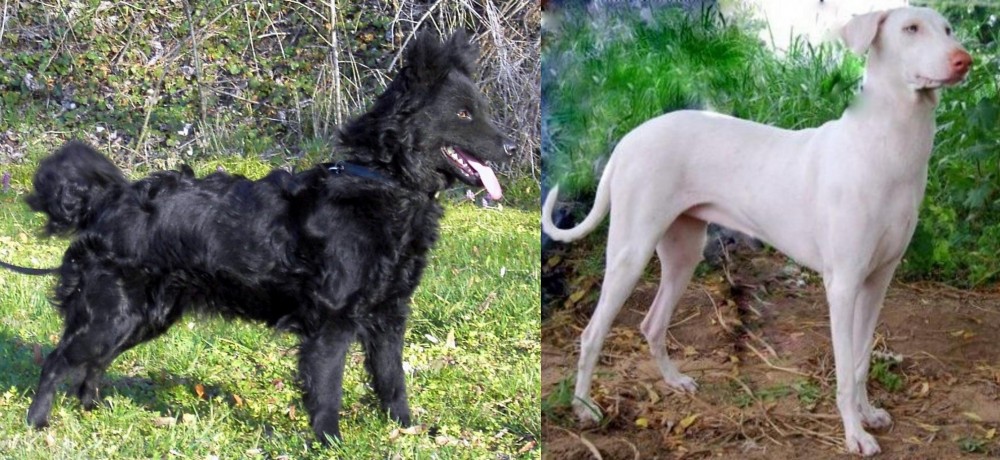 Mudi is originated from Hungary but Rajapalayam is originated from India. Mudi may grow 28 cm / 11 inches shorter than Rajapalayam. Mudi may weigh 11 kg / 24 pounds lesser than Rajapalayam. Both Mudi and Rajapalayam has almost same life span. Both Mudi and Rajapalayam has almost same litter size. Mudi requires Moderate Maintenance. But Rajapalayam requires Low Maintenance
Mudi is originated from Hungary but Rajapalayam is originated from India. Mudi may grow 28 cm / 11 inches shorter than Rajapalayam. Mudi may weigh 11 kg / 24 pounds lesser than Rajapalayam. Both Mudi and Rajapalayam has almost same life span. Both Mudi and Rajapalayam has almost same litter size. Mudi requires Moderate Maintenance. But Rajapalayam requires Low Maintenance
 Sometime between the 4th and 6th centuries, the Great Migration – a variety of dogs came to live in the Carpathian Mountains on the Great Hungarian Plain. This migration period brought sheepdogs and herders brought by shepherds. These dogs were of two sizes both small and large. The smaller ones were bred together – Pumi, Puli, and Mudi. Because of this, these breeds share the same history, with the Mundi being the oldest of them all.
Sometime between the 4th and 6th centuries, the Great Migration – a variety of dogs came to live in the Carpathian Mountains on the Great Hungarian Plain. This migration period brought sheepdogs and herders brought by shepherds. These dogs were of two sizes both small and large. The smaller ones were bred together – Pumi, Puli, and Mudi. Because of this, these breeds share the same history, with the Mundi being the oldest of them all.
The Mundi was finally separated from the other breeds about 1930 when Dr. Deszo Fenyesi began to breed them. It was in 1966 when the F.C.I. finally approved the standard for the breed. Still then as today, there were not many breeders developing the Mudi. They are working dogs – farm dogs – herders, guard dogs and ratters. He is also known as a tracker, with the majority of the breed living in Hungary.
As the Mudi was bred separately from the Pumi and the Puli, differences between the breeds became clear. Many Mudi are born with a stump or no tail at all. The Mudi is not a great dog for the first timer. He is stubborn, assertive and needs a lot of socialization and exercise. In 2004 breeders in the United States created the Mudi Club of America to preserve the breed and foster responsible ownership. This is a clever, active and keen breed, very loyal to his family but wary of strangers. The United Kennel Club recognized the breed in 2006.
In Hungary, these are still a breed of herding dogs capable of running 500 sheep at a time. They are versatile, courageous, intelligent and agile. They are great in obedience trials, agility, and flyball. In Finland and the United States, they also work as search and rescue dogs.
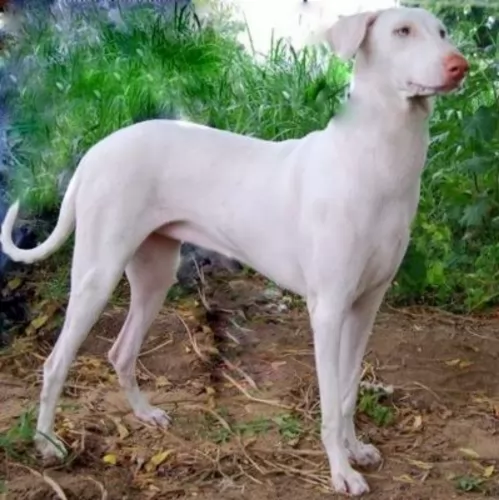 The Rajapalayam dog hails from India, from the small town of Rajapalayam in Tamil Nadu.
The Rajapalayam dog hails from India, from the small town of Rajapalayam in Tamil Nadu.
Known also as the Poligar Hound, this Indian Sighthound has been the companion of royalty in Southern India.
Though the breed dates back a few hundred years, the developers of the breed brought about an albino dog. This Indian breed dog is almost on the verge of extinction. This is a pity as he is a splendid dog. Breeding centers have been set up to prevent the dog disappearing altogether.
 This is a medium size dog with an almost square profile. They have erect ears on wedge-shaped heads. He is not a strong boned but medium boned. That square profile is based in large part on their very square stance. Their muzzle is about half the length of their head and they have what is considered a “dare devil” expression in their dark, almond-shaped eyes. The color of the eyes is important and must match with the color of the dog or the standard is not met.
This is a medium size dog with an almost square profile. They have erect ears on wedge-shaped heads. He is not a strong boned but medium boned. That square profile is based in large part on their very square stance. Their muzzle is about half the length of their head and they have what is considered a “dare devil” expression in their dark, almond-shaped eyes. The color of the eyes is important and must match with the color of the dog or the standard is not met.
Merle fur – brown, brown speckled, blue eyes.
Brown or gray-brown fur – Brown eyes
Gray fur – gray eyes
What is not acceptable is having yellow eyes and black fur; pink eyes and white fur. The lips, eye rims, and nose must all have the same pigmentation. This should be black in all but the brown and brown-grey dogs. These dogs have brown noses, eye rims, and lips. The tail can be almost anything from full to bob. All are considered to be natural lengths for a Mudi.
Their coat is self-cleaning and won’t mat. It is on the long side. In fact, a short, flat, smooth coat is a disqualification from the standard. The color of the coat ranges from white to brown to gray, gray-brown, merle, golden, cream and white. Very little markings of any kind are usual.
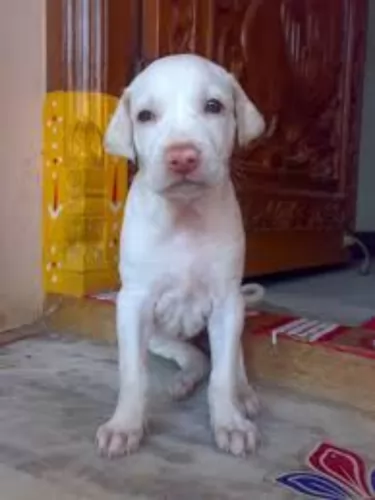 This is a large dog, graceful and elegant standing at between 65–75cm and weighing 22 to 25kg.
This is a large dog, graceful and elegant standing at between 65–75cm and weighing 22 to 25kg.
This is a hound dog, lean and muscular and will rely on good exercise to keep him in tip top working condition.
He is somewhat heavier than other sighthounds with a deep chest and long straight legs. He is a low maintenance dog with the white coat being short and fine. The ears are floppy ad the tail is slim and long and sometimes held up and curved.
The Rajapalayam has always been used for hunting wild boar, and today he makes a good guard- and watchdog. He needs a lot of space and exercise and isn’t suited to living in small spaces in the city.
He is a loving dog and becomes loyal and devoted towards his owner, being essentially a one-person dog. They tend to be aggressive and aloof with strangers.
Training and socialization will be important for this intelligent dog if you want him to behave around people. He doesn’t particularly get on well with other pets in the home, but training and socialization can change this.
 Yes, they are great with children and love being a part of a large family or “pack”.
Yes, they are great with children and love being a part of a large family or “pack”.
They are extremely versatile and great at herding and guarding.
They are adaptable if you are. They don’t need to live in the country, but they need space to run and play.
They are highly intelligent but a little stubborn. Their ability to learn is high but you have to be the boss.
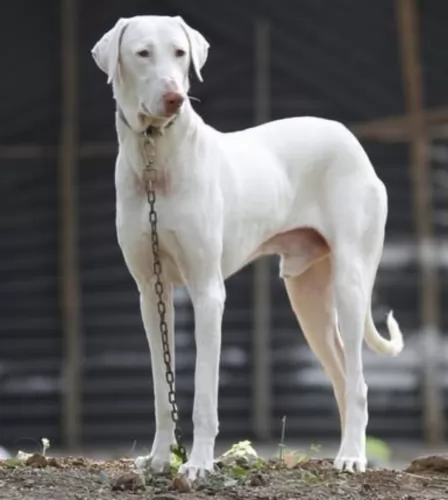 A Rajapalayam dog has always been a hunter and this makes him an excellent watchdog, always on the look out for intruders.
A Rajapalayam dog has always been a hunter and this makes him an excellent watchdog, always on the look out for intruders.
The Rajapalyam has always been a dog deeply attached and loyal to his owners.They are good family companions and pets and with so many good characteristics, one hopes that this dog will still be around for a long time.
 The Mudi does face several of the problems that medium to large dogs often face and some eye issues as well.
The Mudi does face several of the problems that medium to large dogs often face and some eye issues as well.
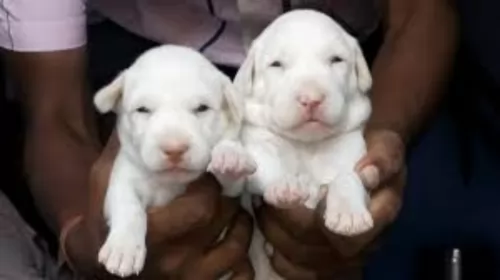 The Rajapalayam isn’t a fragile dog, and he can live to 10, 11 or 12 years of age. There are always a few things to look out for with him. With white dogs, there is always a high incidence of deafness. Puppies born with blue eyes are often deaf.
The Rajapalayam isn’t a fragile dog, and he can live to 10, 11 or 12 years of age. There are always a few things to look out for with him. With white dogs, there is always a high incidence of deafness. Puppies born with blue eyes are often deaf.
White coated dogs, because of the piebald gene, are often affected by deafness. The piebald gene is because of an absence of melanocytes. These are cells which create pigment. When a dog is born without the genes to create melanocyte cells, a white hair coat and sometimes blue eyes are the result.
There are also skin problems associated with these all white dog breeds such as mange and dermatitis. Check him over for ticks and fleas.
 The Mudi needs a high quality, medium breed puppy dry food and should be fed 3 or 4 times a day for a total of 1 and ½ to 2 cups.
The Mudi needs a high quality, medium breed puppy dry food and should be fed 3 or 4 times a day for a total of 1 and ½ to 2 cups.
The adult should be fed at least twice a day with an adult medium breed high-quality dry dog food. Don’t overfeed as the breed can have a tendency toward obesity.
They have great stamina and agility.
This is a working dog and like most herding dogs, they need a job and a lot of activity. Long walks every day and either a large yard or visits to a dog park. Involve them in herding activities or Barn Hunt if you can. Playing is their way of working when they are not herding real animals. So, if you want this breed, be sure you have time for playing with them. They are great at agility, flyball, obedience, frisbee trials, tracking and of course herding
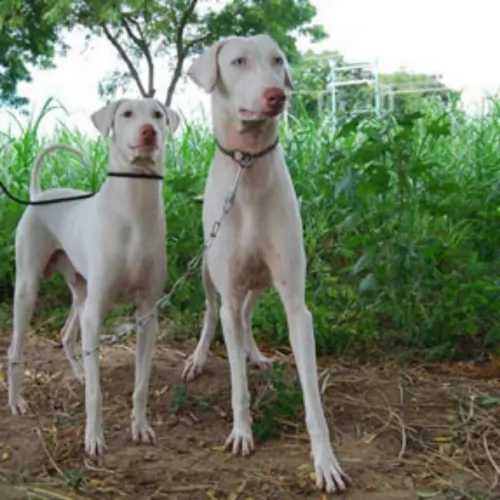 The short coat does shed so he will need to be brushed once or twice a week.
The short coat does shed so he will need to be brushed once or twice a week.
You will also need to follow a regular grooming program with this dog, checking inside his ears for infection, checking his eyes for discharge and checking inside his mouth for bad, rotting teeth. Teeth- and gum disease aren’t just about losing a tooth - bad teeth and gums can cause a host of health issues for other body parts like the heart and kidneys.
His toe nails too wll require clipping to prevent splitting and chipping.
Provide your pet with lots of exercise – a walk every day, a run in the park off his leash as well as ball and frisbee games.
You can’t ever become lax with giving your pet good food. Good, wholesome food promotes health and longevity.
There are some good commercially manufactured dog foods which are wonderfully convenient – you just want to be sure its the high quality ones full of vitamins and minerals.
Also, provide him with uncomplicated, home-made dog food too. Boiled chicken, brown rice or pasta, sweet potatoes, carrots and spinach, all chopped up and mixed in twice a week with the dry kibble will ensue health and contentment.
Try and add some raw meat in as well. This simple diet plan will be gentle on your pet’s digestive system.
Make sure he always has a bowl of fresh, cool water available to him.